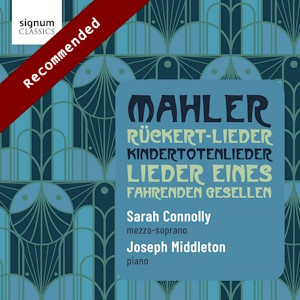
Gustav Mahler (1860-1911)
Rückert-Lieder (1901-02)
Lieder eines fahrenden Gesellen (1884-96)
Kindertotenlieder (1901-04)
Dame Sarah Connolly (mezzo-soprano)
Joseph Middleton (piano)
rec. 2021, St George’s Bristol, Bristol, UK
German texts & English translations included
Signum Classics SIGCD741 [61]
I understand that this disc is the first in a projected series which will see Joseph Middleton record all of Maher’s Lieder with piano accompaniment. I believe that he has lined up a number of singers to take part in this project, starting with Sarah Connolly.
The programme opens with the set of five songs to poems by Friedrich Rückert (1788-1836). These were not conceived as a set by Mahler; each was published separately and I believe I’m right in saying that they were only re-published as the now-familiar set in 1910. They may have been independently conceived but they combine as a most satisfying set. Sarah Connolly and Joseph Middleton impress at once, imparting a gentle, airy quality to ‘Ich atmet’ einen linden Duft’. This performance seems permeated by ‘The gentle fragrance of love’ (as Richard Stokes translates the final line). In his notes, Gavin Plumley rightly describes ‘Um Mitternacht’ as “a dark night of the soul”. Here, there’s tension right from the start of the performance. In an expressive performance, Sarah Connolly pours out feeling (without any exaggeration) and identifies marvellously with the sentiments of Rückert’s words. Joseph Middleton conjures up an orchestral range of colours from the piano. The climax (‘In deine Hand gegeben’) sounds both elevated and confident here. The set concludes with ‘Ich bin der Welt abhanden gekommen’, one of Mahler’s greatest songs. At the start, time seems to stand still; Middleton’s playing is outstandingly atmospheric, paving the way wonderfully for his singer. Connolly’s singing is exquisitely poised. Some may miss the orchestral colours, but there are more than ample compensations; the song here acquires a great sense of intimacy. Sarah Connolly sings the song marvellously and time and again my ear was captivated by an aspect of Middleton’s playing; his touch is wonderful and it seems that every note is expertly weighted. Furthermore, his use of rubato is very special indeed, not least because it appears so natural. These two artists make the song a compelling experience.
The earliest set of songs here is Lieder eines fahrenden Gesellen. These were originally composed between 1884 and 1885 but then revised at various times – and orchestrated – prior to the first performance in 1896, which was given in the orchestral version. The texts are by Mahler himself but he was heavily influenced by the collection of German folk poetry, Des Knaben Wunderhorn, published by Achim von Arnim and Clemens Brentano between 1805 and 1808; these poems exerted a tremendous influence throughout Mahler’s compositional career. In the first song, ‘Wenn mein Schatz Hochzeit macht’, Connolly draws us in to the sorrowful tale, supported at every turn by Middleton. Mahler used material from the second song, ‘Ging heut’ Morgen über’s Feld’ in the first movement of his First Symphony. There’s often a youthful jauntiness in the music and that’s brought out here; also, though, there are sorrowful episodes and in these Connolly tugs at our heart strings. I very much approve of the dramatic bite and air of desperation that the performers bring to ‘Ich hab’ ein glühend Messer’. In the last song, ‘Die zwei blauen Augen von meinem Schatz’ we encounter more music that found its way into the First Symphony; in this case, to the third movement. The present performance is weighted with sorrow, not least because the depth of tone from the bass end of Middleton’s piano distils a powerful funereal ambience. In the passage beginning ‘Auf der Straße stand ein Lindenbaum’ Connolly is deeply expressive. She and Middleton bring this song to a very moving end.
For Kindertotenlieder Mahler went back to the poetry of Rückert and fashioned five memorable songs which reflected his own experiences. ‘Nun will die Sonn’ so hell aufgeh’n’ is a deeply sorrowful song which here receives a searching performance. Connolly conveys the aching regret in ‘Nun seh’ ich wohl, warum so dunkle Flammen’; the central episode is impassioned. She conveys a deep sense of loss in ‘Wenn dein Mütterlein’. The last of the songs is the remarkable ‘In diesem Wetter, in diesem Braus’. The piano version is a huge challenge for the pianist who has to conjure up the turbulence of Mahler’s stormy writing. Needless to say, Middleton accomplishes this; his playing has real power and significant definition. Connolly expresses the mother’s desperate worrying over her missing children. Both musicians give a powerful, dramatic rendition of the song, during which Middleton whips up a fearsome tempest. However, in the final stanza the mother accepts the fate that has befallen her children; Connolly brings out all the poignancy in Mahler’s writing, after which Middleton’s pianism in the postlude applies gentle balm.
This is an exceptionally fine Mahler recital. Sarah Connolly is perfectly attuned to Mahler’s music and consistently identifies with the words in an ideal fashion. Joseph Middleton’s playing is wonderful; the greatest compliment I can pay him is to say that never once while playing this disc have I yearned for the orchestral versions of these songs. These two fine musicians are deeply imaginative in their approach and they evidence an instinctive and very idiomatic partnership. Engineer/producer Andrew Middleton has recorded them expertly.
I mentioned earlier that this is the first disc in a promised series curated from the piano by Joseph Middleton. He and Sarah Connolly have set the bar very high for future releases and I look forward to further instalments with keen anticipation
John Quinn
Previous review: Göran Forsling (August 2023)
Help us financially by purchasing from




















